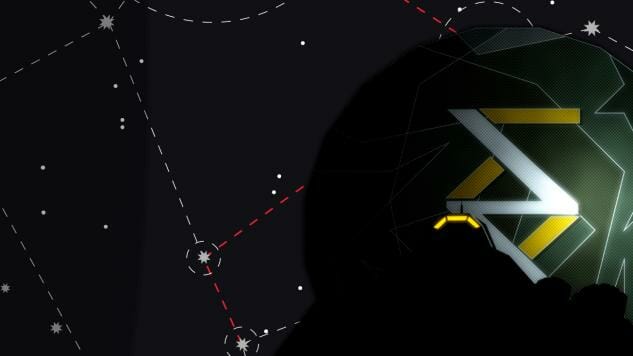Science fiction is a relatively new genre. I grew up reading classic literature and learning from professors that taught me that there were distinct differences between literary fiction and genre fiction, so my knowledge of sci-fi was incredibly limited. Still, I’ve always seen space as a set of boundless possibilities. With so much still unknown about what lies beyond our solar system, it would seem like sci-fi stories can be the most outrageous, the most distant from our everyday lives. But in truth, sci-fi can touch on the human condition just as much as any piece of literary work.
Voageur is one of those games that hits me right in my literary travel bones. Set on a one-way trip to the center of galaxy, Voyageur is about finding those small moments of humanity during a trip to your descent. Humans live all over the galaxy, and their influence has spread along with them. During the trip, players can learn about each world’s happenings, what cultures the civilians have created for themselves, and what trouble they’ve found themselves in.
The game is a small but sharp look into being an observer and a participant to other people’s affairs. As you decide on which people to help, and what things to learn, your character grows as well. Parts of the game feels repetitive. For example, some planets have older travelers who are willing to tell you a little about their adventures. Every traveler I’ve talked to started their story by saying it was a “tale of woe,” although their stories did differ. Other acts are similar from planet to planet, such as visiting a monument or researching planetary data.
But even with its small scope, each story differs from one another. In one playthrough, I was an intelligent traveler looking to gain as much data as possible to fill my need for knowledge. In another, I started my journey helping a fugitive earn a new life in a better planet. From there, I dedicated my travels to helping those in need find new, safer places to live. Games like Voyageur are great at showcasing the importance of time and impact. It isn’t a clumsy attempt at discussing real-world issues through technology; it tells its own stories through the lives of the people on each planet.
There’s lots of talk about the impact of sci-fi narratives in a world that is slowly becoming more tech-heavy. Upcoming game Cyberpunk 2077 is facing criticisms for its demo which looked like a shallow take on sci-fi and punk culture. Quantic Dreams’ recent game Detroit:Become Human garnered backlash for its unwieldy comparisons between racism and robot oppression. Clearly, videogames aren’t quite sure how to handle science fiction when compared to the troubles of modern day.
But there are games like Voyageur that succeed because they’re focused less on the big picture, and more on the day-to-day of people. Of course, there is a larger theme and mystery to the game, but that theme is carried and created by the people and the stories they’re willing to share with a strange traveler. Perhaps the human condition is universal, even if humans aren’t.
Shonté Daniels is a poet who occasionally writes about games. Her games writing has appeared in Kill Screen, Motherboard, Waypoint and elsewhere. Her poetry can be seen at Puerto del Sol, Baltimore Review, Phoebe, and others literary journals. Check out Shonte-Daniels.com for a full archive, or follow her for sporadic tweeting.
